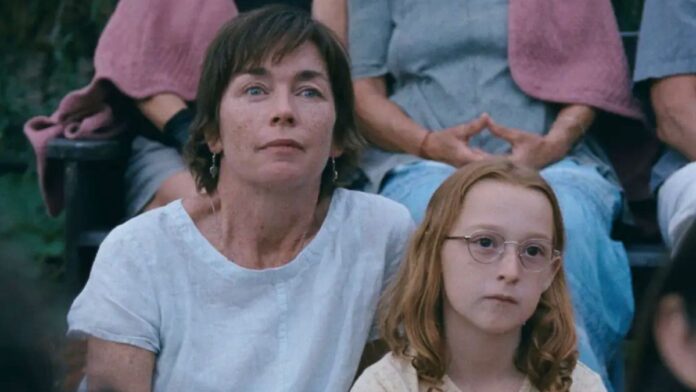In Annie Baker’s feature debut, Janet Planet, the intricate dynamics between a mother and daughter unfold in a poignant exploration of love, dependency, and the haunting specter of adult melancholy. Julianne Nicholson delivers a powerful performance as Janet, a New Age acupuncturist whose life is both a sanctuary and a source of turmoil for her 11-year-old daughter, Lacy, played with endearing vulnerability by newcomer Zoe Ziegler.
The film opens with a stark image: Lacy, desperate and distraught, threatens to kill herself if she isn’t immediately picked up from camp. This cry for help sets the tone for the intense emotional landscape that Janet Planet navigates. Set in 1991, the story unfolds in a secluded cabin in the wilds of Massachusetts, where Janet and Lacy’s lives are deeply entwined, almost to a fault. Wayne (Will Patton), Janet’s boyfriend, finds it peculiar that Lacy still shares her mother’s bed, a testament to their inseparable bond.
Baker, known for her Pulitzer Prize-winning play The Flick, brings her theatrical sensibility to the film, creating a meticulously structured three-act narrative. Each adult entering Janet’s life—Wayne, Regina (Sophie Okonedo), and Avri (Elias Koteas)—leaves a significant imprint on Lacy. Wayne, the dispassionate boyfriend, injects a sour tension into the home, while Regina, an old friend with insight into Janet’s past, challenges her delusions. The arrival of Avri, a cult-like theatre troupe leader, in the final act intensifies the film’s haunting atmosphere.
Nicholson’s portrayal of Janet is nothing short of mesmerizing. Her eyes, brilliant blue yet strained, convey a history of muted anguish. She embodies a character acutely aware of her unraveling, a trait evident in her previous roles, whether as a troubled mother in Blonde or a dysfunctional daughter in August: Osage County. This self-awareness adds a tragic depth to her performance, making her character’s gradual loss of control all the more heartbreaking.
Ziegler, as Lacy, is instantly lovable. Her large wire-frame glasses give her a turtle-like charm, cautious yet curious. Her interactions with the adults around her are tinged with a poignant mixture of innocence and the premature burden of adult melancholy. This is illustrated in a scene with her piano teacher’s Red Riding Hood doll, which transforms from an innocent girl to a menacing wolf, symbolizing Lacy’s precarious position between childhood and the harsh realities of her mother’s world.
Baker’s directorial approach is visually and narratively precise, often evoking the haunting self-portraits of photographer Francesca Woodman. The film’s carefully posed frames and dialogue are imbued with symbolic weight, embracing a deliberate artificiality that enhances its thematic depth. Despite its sparse narrative, Janet Planet is rich with implications, drawing viewers into its meticulously crafted emotional tapestry.
In conclusion, Janet Planet is a haunting and introspective film that masterfully explores the complex, often fraught bond between mother and daughter. Julianne Nicholson and Zoe Ziegler deliver standout performances that linger long after the credits roll. Baker’s theatrical sensibility and keen directorial eye make for a compelling cinematic experience, one that resonates with the quiet, profound echoes of personal and familial turmoil.
Must Read: A Family Affair Review: Nicole Kidman and Zac Efron Shine in Netflix’s Charming Rom-Com




